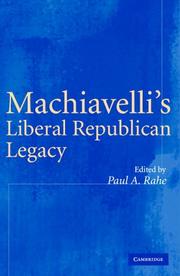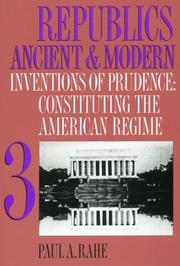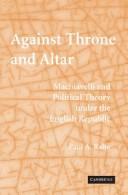| Listing 1 - 10 of 10 |
Sort by
|

ISBN: 9780521851879 0521851874 9780511509667 9780521153539 051113746X 9780511137464 0511509669 7487030679 9787487030676 1280431660 9781280431661 0511183623 9780511183621 0511201672 9780511201677 0511135297 9780511135293 110715426X 051131180X 0521153530 Year: 2006 Publisher: New York Cambridge University Press
Abstract | Keywords | Export | Availability | Bookmark
 Loading...
Loading...Choose an application
- Reference Manager
- EndNote
- RefWorks (Direct export to RefWorks)
The significance of Machiavelli's political thinking for the development of modern republicanism is a matter of great controversy. In this volume, a distinguished team of political theorists and historians reassess the evidence, examining the character of Machiavelli's own republicanism and charting his influence on Marchamont Nedham, James Harrington, John Locke, Algernon Sidney, John Trenchard, Thomas Gordon, David Hume, the Baron de Montesquieu, Benjamin Franklin, George Washington, John Adams, Thomas Jefferson, James Madison, and Alexander Hamilton. This work argues that while Machiavelli himself was not liberal, he did set the stage for the emergence of liberal republicanism in England. By the exponents of commercial society he provided the foundations for a moderation of commonwealth ideology and exercised considerable, if circumscribed, influence on the statesmen who founded the American Republic. Machiavelli's Liberal Republican Legacy will be of great interest to political theorists, early modern historians, and students of the American political tradition.
Machiavelli, Niccolò --- Republicanism --- History. --- Machiavelli, Niccolò, --- Influence. --- Machiavelli, Niccolò, --- マキアヴェルリ --- Social Sciences --- Political Science --- Republicanism - History. --- Machiavelli, Niccolò, - 1469-1527 - Influence. --- Machiavelli, Niccolò, - 1469-1527 --- Machiavelli, Niccolo,
Book
ISBN: 9780300116427 030011642X 9780300218602 0300218605 9780300227093 0300227094 Year: 2015 Publisher: New Haven
Abstract | Keywords | Export | Availability | Bookmark
 Loading...
Loading...Choose an application
- Reference Manager
- EndNote
- RefWorks (Direct export to RefWorks)
"More than 2,500 years ago a confederation of small Greek city-states defeated the invading armies of Persia, the most powerful empire in the world. In this meticulously researched study, historian Paul Rahe argues that Sparta was responsible for the initial establishment of the Hellenic defensive coalition and was, in fact, the most essential player in its ultimate victory. Drawing from an impressive range of ancient sources, including Herodotus and Plutarch, the author veers from the traditional Atheno-centric view of the Greco-Persian Wars to examine from a Spartan perspective the grand strategy that halted the Persian juggernaut. Rahe provides a fascinating, detailed picture of life in Sparta circa 480 B.C., revealing how the Spartans' form of government and the regimen to which they subjected themselves instilled within them the pride, confidence, discipline, and discernment necessary to forge an alliance that would stand firm against a great empire, driven by religious fervor, that held sway over two-fifths of the human race."--Dust jacket.
Sparta (Extinct city) --- Greece --- History --- Strategic aspects --- Civilization --- Sparte (Ville ancienne) --- Grèce --- History. --- Strategic aspects. --- Civilization. --- Histoire --- Civilisation. --- Grèce --- HISTORY / Ancient / Greece. --- Antiken --- Sparta (Extinct city) - History --- Sparta (Extinct city) - Strategic aspects --- Sparta (Extinct city) - Civilization --- Greece - History - Persian Wars, 500-449 B.C.

ISBN: 080784473X 0807844748 0807844756 9780807844731 9780807844755 9780807844748 Year: 1994 Publisher: Chapel Hill, N.C.: University of North Carolina press,
Abstract | Keywords | Export | Availability | Bookmark
 Loading...
Loading...Choose an application
- Reference Manager
- EndNote
- RefWorks (Direct export to RefWorks)
Political science --- Republicanism --- Science politique --- Républicanisme --- History --- Histoire --- United States --- Etats-Unis --- Politics and government --- Politique et gouvernement --- History. --- Républicanisme --- Political science - United States - History - 18th century --- Republicanism - History --- Political science - Greece - History
Book
ISBN: 0300224613 9780300219012 9780300224610 0300219016 Year: 2016 Publisher: New Haven
Abstract | Keywords | Export | Availability | Bookmark
 Loading...
Loading...Choose an application
- Reference Manager
- EndNote
- RefWorks (Direct export to RefWorks)
An authoritative and refreshingly original consideration of the government and culture of ancient Sparta and her place in Greek history For centuries, ancient Sparta has been glorified in song, fiction, and popular art. Yet the true nature of a civilization described as a combination of democracy and oligarchy by Aristotle, considered an ideal of liberty in the ages of Machiavelli and Rousseau, and viewed as a forerunner of the modern totalitarian state by many twentieth-century scholars has long remained a mystery. In a bold new approach to historical study, noted historian Paul Rahe attempts to unravel the Spartan riddle by deploying the regime-oriented political science of the ancient Greeks, pioneered by Herodotus, Thucydides, Plato, Xenophon, and Polybius, in order to provide a more coherent picture of government, art, culture, and daily life in Lacedaemon than has previously appeared in print, and to explore the grand strategy the Spartans devised before the arrival of the Persians in the Aegean.
E-books --- Sparta (Extinct city) --- History. --- Politics and government. --- Lacedaemon (Extinct city) --- Lakedaímon (Extinct city) --- Sparta (Ancient city) --- Greece --- Antiquities --- HISTORY / Ancient / Greece.
Book
ISBN: 9780300144925 030014492X Year: 2009 Publisher: New Haven : Yale University Press,
Abstract | Keywords | Export | Availability | Bookmark
 Loading...
Loading...Choose an application
- Reference Manager
- EndNote
- RefWorks (Direct export to RefWorks)
Democracy. --- Republicanism. --- Démocratie --- Républicanisme --- Montesquieu, Charles de Secondat, --- Tocqueville, Alexis de, --- Rousseau, Jean-Jacques, --- Democracy --- Republicanism --- Political science --- Self-government --- Equality --- Representative government and representation --- Republics --- Rousseau, Jean Jacques --- Tocqueville, Alexis Charles Henri Maurice Clérel de, --- Tokvilʹ, Alekseĭ de, --- De Tokvilʹ, Alekseĭ, --- Tokvilʹ, Aleksis de, --- De Tocqueville, Alexis, --- Tokuviru, Alexis, de, --- Toqueville, Alexis de, --- טוקוויל, אלכסיס דה --- توكڤيل، ألكسي دو، --- Tūkvīl, Āliksī dū, --- توکويل، آلکسى دو --- Clérel, Alexis Henri Charles de, --- Rouseau, Jan Jakub, --- Russo, Zhan Zhak, --- Rousseau, John James, --- Rūssū, Jān Jāk, --- Lu-so, --- Ru-xô, Giăng-Giá̆c, --- Rousseau, Jean Jaques, --- Rousseau, Jean Jeacques, --- Rousseau, J. J. --- Rusō, Jan Jakku, --- Rousseau, Gian Giacomo, --- Ruso, Z'an Z'aḳ, --- Rūcō, --- Citoyen de Genève, --- Citizen of Geneva, --- Roussō, --- Rousseau, --- Rūssō, --- Rousseau, Johann Jacob, --- Руссо, Жан-Жак, --- רוסא, זשאן־זשאק --- רוסא, י׳ן י׳ק, --- רוסו, זאאן זאאק, --- רוסו, ז׳אן־ז׳אק, --- روسو، چان چاك --- روسو، ژان ژاك --- 卢梭, --- Rousseau, Juan Jacobo, --- Rousseau, G. G. --- Ruso, Jan Jak, --- Rūsaw, Zhān Zhāk, --- Rūsū, Zhān Zhāk, --- Mengdesijiu, --- Mongtētkiʻǣ, --- Monteskʹe, Sharlʹ Lui, --- Monteskīĭ, --- Monteskiusz, --- Monteskiyü, --- Monṭesḳyeh, --- Montesquieu, --- Montesquieu, Charles Louis de Secondat, --- Montesquiou, --- Montesukyū, --- Muntisikyū, --- Secondat, Charles-Louis de, --- מונטסקייה --- モンテスキウ̄, --- 孟德斯鳩, --- Rousseau, Jean-Jacques

ISBN: 9780521883900 9780511509650 9780521123952 0511387350 9780511387357 0511384505 9780511384509 9780511388347 0511388349 0511509650 0521883903 052112395X 110718598X 128125505X 9786611255053 0511382685 0511386338 6611255052 9780511382680 9780511386336 Year: 2008 Publisher: Cambridge New York Cambridge University Press
Abstract | Keywords | Export | Availability | Bookmark
 Loading...
Loading...Choose an application
- Reference Manager
- EndNote
- RefWorks (Direct export to RefWorks)
Modern republicanism - distinguished from its classical counterpart by its commercial character and jealous distrust of those in power, by its use of representative institutions, and by its employment of a separation of powers and a system of checks and balances - owes an immense debt to the republican experiment conducted in England between 1649, when Charles I was executed, and 1660, when Charles II was crowned. Though abortive, this experiment left a legacy in the political science articulated both by its champions, John Milton, Marchamont Nedham, and James Harrington, and by its sometime opponent and ultimate supporter, Thomas Hobbes. This volume examines these four thinkers, situates them with regard to the novel species of republicanism first championed in the early 1500s by Niccolò Machiavelli, and examines the debt that he and they owed the Epicurean tradition in philosophy and the political science crafted by the Arab philosophers Alfarabi, Avicenna, and Averroës.
History of the United Kingdom and Ireland --- Machiavelli, Niccolò --- anno 1600-1699 --- Republicanism --- Political science --- History --- Machiavelli, Niccolò, --- Influence. --- Great Britain --- Politics and government --- マキアヴェルリ --- Social Sciences --- Political Science
Book
ISBN: 9781641773386 1641773383 Year: 2023 Publisher: San Francisco Encounter Books
Abstract | Keywords | Export | Availability | Bookmark
 Loading...
Loading...Choose an application
- Reference Manager
- EndNote
- RefWorks (Direct export to RefWorks)
The great expedition to Sicily described in the sixth and seventh books of Thucydides'history can be depicted in a variety of ways. By some, it has been thoughtfully treated as an example of overreaching on the part of the Athenians. By others, it has been singled out as a sterling example of patriotism, courage, and grit on the part of the Syracusans. Never until now, however, has anyone examined this conflict from a Spartan perspective – despite the fact that Lacedaemon was the war's principal beneficiary and that her intervention with the dispatch of a single Spartiate – turned the tide and decided the outcome. In Sparta's Sicilian Proxy War, Paul Rahe first outlines the struggle's origins and traces its progress early on, then examines the reasons for Sparta's intervention, analyzes the consequences, and retells the story of Athens'ignominious defeat. Rarely in human history has a political community gained so much at so little cost through the efforts of a single man.
Sicilian Expedition, Italy, 415-413 B.C --- Sparta (Extinct city) --- Sicily (Italy) --- Greece --- History, Military. --- Strategic aspects. --- History
Book
ISBN: 0300249268 9780300249262 9780300242614 0300242611 Year: 2019 Publisher: New Haven
Abstract | Keywords | Export | Availability | Bookmark
 Loading...
Loading...Choose an application
- Reference Manager
- EndNote
- RefWorks (Direct export to RefWorks)
A companion volume to The Spartan Regime and The Grand Strategy of Classical Sparta that explores the collapse of the Spartan†'Athenian alliance During the Persian Wars, Sparta and Athens worked in tandem to defeat what was, in terms of relative resources and power, the greatest empire in human history. For the decade and a half that followed, they continued their collaboration until a rift opened and an intense, strategic rivalry began. In a continuation of his series on ancient Sparta, noted historian Paul Rahe examines the grounds for their alliance, the reasons for its eventual collapse, and the first stage in an enduring conflict that would wreak havoc on Greece for six decades. Throughout, Rahe argues that the alliance between Sparta and Athens and their eventual rivalry were extensions of their domestic policy and that the grand strategy each articulated in the wake of the Persian Wars and the conflict that arose in due course grew out of the opposed material interests and moral imperatives inherent in their different regimes.
500-449 B.C. --- Greece --- Athens (Greece) --- Sparta (Extinct city) --- History --- Relations --- Persian Wars (Greece : 500-449 B.C.) --- History, Military. --- Strategic aspects.
Book
ISBN: 9780300242614 Year: 2019 Publisher: New Haven Yale University Press
Abstract | Keywords | Export | Availability | Bookmark
 Loading...
Loading...Choose an application
- Reference Manager
- EndNote
- RefWorks (Direct export to RefWorks)
Persian Wars (Greece : 500-449 B.C.) --- Sparta (Extinct city) --- Sparta (Extinct city) --- Greece --- History, Military. --- Strategic aspects. --- History
Book
ISBN: 0300255756 9780300255751 030024262X 9780300242621 Year: 2020 Publisher: New Haven
Abstract | Keywords | Export | Availability | Bookmark
 Loading...
Loading...Choose an application
- Reference Manager
- EndNote
- RefWorks (Direct export to RefWorks)
In a continuation of his multivolume series on ancient Sparta, Paul Rahe narrates the second stage in the six-decades-long, epic struggle between Sparta and Athens that first erupted some 17 years after their joint victory in the Persian Wars. Rahe explores how and why open warfare between these two erstwhile allies broke out a second time, after they had negotiated an extended truce. He traces the course of the war that then took place, he examines and assesses the strategy each community pursued and the tactics adopted, and he explains how and why mutual exhaustion forced on these two powers yet another truce doomed to fail. At stake for each of the two peoples caught up in this enduring strategic rivalry, as Rahe shows, was nothing less than the survival of its political regime and of the peculiar way of life to which that regime gave rise.
Sparta (Extinct city) --- Greece --- History, Military. --- History
| Listing 1 - 10 of 10 |
Sort by
|

 Search
Search Feedback
Feedback About UniCat
About UniCat  Help
Help News
News